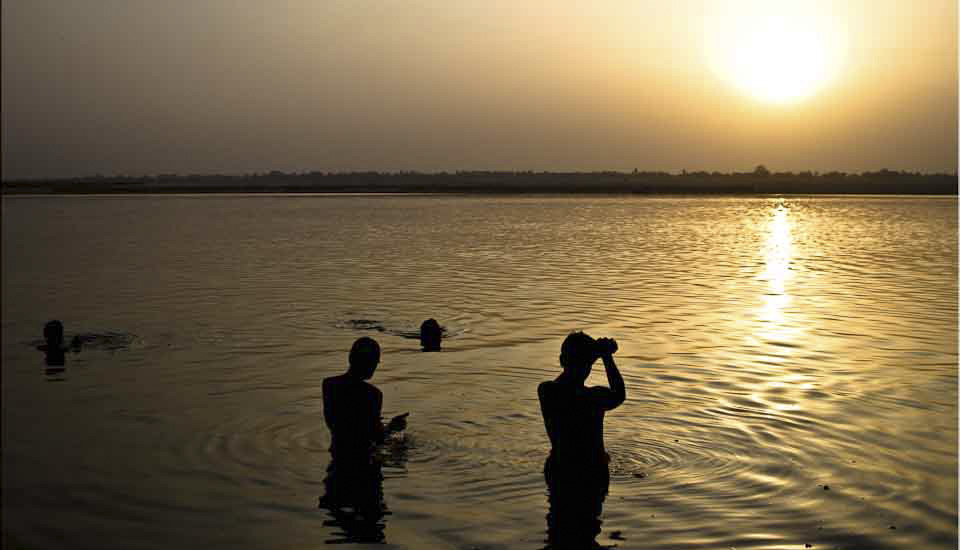.jpg)
Zähringerbrunnen : the Zähringer Fountain
In the UNESCO-listed medieval city-centre of Bern, a fountain topped by a bear in full armour, with a cub at his feet, was built in 1535 as a commemoration to Berchtold von Zähringer, who founded the city in 1191. (iPhone5)
The Swiss city of Bern is indelibly associated with bears. The bear has featured on the city seal and coat of arms since at least the 1220s. Stories relating to the keeping of live bears in a Bärengraben (bear pit) in the centre of the city – in what is still called Bärenplatz (Bear Plaza) – date back to the 1440s (or 1513 – depending on your source!).
Legend has it that Bern was named for the bear that Berchtold V, Duke of Zähringen, came across in the wood that was to be cleared for his new city. He had vowed to name the city for the first animal he saw on his hunt.
This story is widely questioned. For a long time it was thought that the city might have been named after the Italian city of Verona, then known as Bern in Middle High German. Scholars since the 1980s, however, think the name is of Celtic origin.
What is not in question is that Berthold V founded Bern in 1191. He had been charged with establishing a city to help solidify his family’s position over their land holdings. The Zähringer ruling family, decreed dukes by the German king, held much of what is today Switzerland – then considered part of southern Burgundy. In order to reinforce their position in the region, they started or expanded a number of settlements.
For Bern, Berchtold V chose an easily defensible, long and narrow hilly peninsula, surrounded by the Aare river on three sides. Somehow, the old city has managed to retain its medieval charm, while functioning in the modern world. Tram tracks run down the cobbled streets; up-market hotels, fashionable boutiques, and quirky coffee shops are tucked into the covered, arcaded sidewalks. Everywhere you turn, there are colourful statues and fountains and clock towers. Guild flags hang from the buildings that once housed them; canton flags hang from the Renaissance-style Bundeshaus (Parliament Building); geraniums hang from every window. It is the best-preserved historic town centre in Switzerland, and – as the “Old City of Berne” – it was UNESCO-heritage listed in 1983.
The beauty of travelling in Europe is that everything is accessible by train. My husband and I were travelling from England. Friends of ours from Zurich met up with us, and we spent a leisurely day walking around the Old City.
.jpg)
Busker on a Dudelsackspieler
Evening in the centre of Old Bern is lively, in spite of a threat of rain. (iPhone5)
.jpg)
Parliament House
Evening clouds hang over the buildings used by the National Council and the Council of States. (iPhone5)

Nine Men’s Morris
The restaurants fill up as people stroll the streets. (iPhone5)

Bundes Platz – Parliament Square

Flags of the Cantons – Bundeshaus

To the Bundeshaus Terraces
An archway leads to the back of the parliament buildings, …

Woman in the Fountain
… where there are gardens …

View from the Bundeshaus Terraces
… and views over the red-roofed buildings below.

BEKB Bank Building, Bundesplatz

Bern Old City Streets
Trams and pedestrians share the old cobbled streets.

Zytglogge
Bern’s 800-year-old mechanical clock in its 23-meter tower is one of the the city’s most famous landmarks.

Lion – Marktgasse
(iPhone5)

Old Clock Tower – Zytglogge
The Old Clock Tower, built by Caspar Brunner between 1527 and 1530, in what was once Bern’s west gate

Medieval Bern
The buildings in the Old City include 15th-century arcades of painted limestone.

Doors to the Underground on Kramgasse
Intriguing slanted doors lead down to cellar stores and coffee shops.

Monkey Guild Statue

Zähringerbrunnen and Zytglogge on Kramgasse
Medieval clock towers and Renaissance fountains are features of the Old City.

Vennerbrunnen – Ensign Fountain
The ensign, carrying a flag with the bear of Bern, promises to protect the city.

Das Berner Rathaus – City Hall

Medieval Ships and Dreams
There are plenty of shops to fire the imagination.

The Fast-Flowing Aare
To reach the Rose Garden and the Bear Park, we crossed the Nydeggbrücke over the Aare River.

The Old Bärengraben – Bear Pit
Bern’s first captive bears were held at Bärenplatz (Bear Square) in the Old City from the 1400s or 1500s. The bear enclosures here were first opened in 1857, and were upgraded numerous times. Due to ongoing protests from animal rights groups, the newer Bärenpark was opened in 2009, and this section of pit became an information area, access to the Bärengraben’s shop, and a performance space.

Eurasian brown bear (Ursus arctos arctos)
The bears remaining here, near the old enclosures look healthy, but forlorn.

Funding Cobbles
Contributors to the improvements are commemorated in the walkways.

View over Old Bern
At the Rose Gardens, we enjoyed a late lunch – and views over the old city.

The Bärenpark
We walked back down the hill through the Bärenpark – opened in 2009 –

Eurasian Brown Bear (Ursus Arctos Arctos)
– where the bears have more room to roam between the old Bärengraben and the bank of the River Aare.

Waiting for the Zytglogge
We made our way back through the old city, where people were waiting at the east face –

Zytglogge
– for the old clock to perform. At four minutes to the hour, the clock’s mechanical figures (including bears, a crowing cock, a fool, a knight, and a piper) begin their procession.

On Swiss Rail
We collected our bags, made our way to the train station, and – sadly – left Bern behind.
It was a delightful city to visit.
Like I said – that’s the beauty of Europe: every delightful city is just a rail-trip away.
Happy Travels!
Photos: 30-31July2014


































.jpg)


[…] It was summer – many years ago now – and we had several weeks in which to explore Switzerland. On the advice of Swiss friends, we had pre-purchased Swiss Rail Passes and had already enjoyed making extensive use of them to get around the country (eg: Wanderweg around the Pfäffikersee; Balade Des Fontaines, Aigle; Château de Chillon; Schaffhausen and Neuhausen am Rheinfall; Gruyères; The Salt Mines of Bex; Leysin; Lucerne; Bern). […]